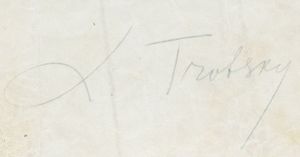Difference between revisions of "Leon Trotsky (1879-1940)"
| Line 1: | Line 1: | ||
[[File:Trotsig.jpg|right|border|thumb|300px|Trotsky's signature]] | [[File:Trotsig.jpg|right|border|thumb|300px|Trotsky's signature]] | ||
Leon Trotsky (Len Davidovitch Bornstein), 1879-1940, Russian revolutionary and co-architect of the Russian Revolution, has an interesting ''what if'' connection with the University of Edinburgh. He was invited to stand for election as [[Rector]] in 1935 by [[Reginald Nathaniel Levitt]] on behalf of a group of students 'of all shades of political opinion'. Though honoured, he felt compelled to decline the invitation. | Leon Trotsky (Len Davidovitch Bornstein), 1879-1940, Russian revolutionary and co-architect of the Russian Revolution, has an interesting ''what if'' connection with the University of Edinburgh. He was invited to stand for election as [[Rector]] in 1935 by [[Reginald Nathaniel Levitt]] on behalf of a group of students 'of all shades of political opinion'. Though honoured, he felt compelled to decline the invitation. | ||
| − | |||
| − | |||
| − | |||
| − | |||
This was the same year that [[Rudyard Kipling (1865-1936)]] was invited but also declined to stand. It was [[Edmund Henry Hynman Allenby, 1st Viscount Allenby (1861-1936)|Viscount Allenby of Megiddo]] who went on to become the Edinburgh University Rector in 1935, though he died very suddenly in London the following year from a ruptured cerebral aneurysm - on 14 May 1936. [[Sir Herbert John Clifford Grierson (1866-1960)|Sir Herbert Grierson]] was elected in the ensuing [[Rectorial Election, 1936|Rectorial Election]]. | This was the same year that [[Rudyard Kipling (1865-1936)]] was invited but also declined to stand. It was [[Edmund Henry Hynman Allenby, 1st Viscount Allenby (1861-1936)|Viscount Allenby of Megiddo]] who went on to become the Edinburgh University Rector in 1935, though he died very suddenly in London the following year from a ruptured cerebral aneurysm - on 14 May 1936. [[Sir Herbert John Clifford Grierson (1866-1960)|Sir Herbert Grierson]] was elected in the ensuing [[Rectorial Election, 1936|Rectorial Election]]. | ||
Revision as of 14:22, 10 August 2016
Leon Trotsky (Len Davidovitch Bornstein), 1879-1940, Russian revolutionary and co-architect of the Russian Revolution, has an interesting what if connection with the University of Edinburgh. He was invited to stand for election as Rector in 1935 by Reginald Nathaniel Levitt on behalf of a group of students 'of all shades of political opinion'. Though honoured, he felt compelled to decline the invitation.
This was the same year that Rudyard Kipling (1865-1936) was invited but also declined to stand. It was Viscount Allenby of Megiddo who went on to become the Edinburgh University Rector in 1935, though he died very suddenly in London the following year from a ruptured cerebral aneurysm - on 14 May 1936. Sir Herbert Grierson was elected in the ensuing Rectorial Election.
Trotsky had been exiled from Russia in 1929 and his reply to Levitt was written less than a fortnight before he left France, after two years there, to begin a year and a half in Norway. Just a year after the invitation from Edinburgh students, Trotsky settled in Mexico. On 20 August 1940, acting on the orders of Stalin, Ramon Mercader attacked Trotsky with an ice pick and he died the next day.
Sources
Trotsky’s Diary in Exile, 1935 (Faber & Faber, 1958)
